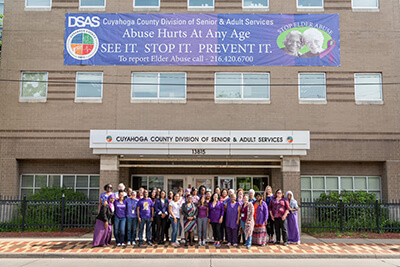What is Elder Abuse
 In general, elder abuse refers to intentional or neglectful acts by a caregiver or “trusted” individual that lead to, or may lead to, harm of an older adult age 60 or over. In Ohio, younger adults with disabilities may qualify for the
same services and protections. Physical abuse; neglect; emotional or psychological abuse; financial abuse and exploitation; sexual abuse; and abandonment are considered forms of elder abuse. In Ohio, self-neglect is also considered abuse.
In general, elder abuse refers to intentional or neglectful acts by a caregiver or “trusted” individual that lead to, or may lead to, harm of an older adult age 60 or over. In Ohio, younger adults with disabilities may qualify for the
same services and protections. Physical abuse; neglect; emotional or psychological abuse; financial abuse and exploitation; sexual abuse; and abandonment are considered forms of elder abuse. In Ohio, self-neglect is also considered abuse.
What types of things are considered abuse?
The most common types of elder abuse reported in Ohio are neglect, self-neglect, exploitation, and emotional, physical and sexual abuse.- Neglect or Self-Neglect is the failure of an adult to provide the goods or services necessary for his or her own safety and/or well-being − such as avoiding physical harm, mental anguish or mental illness − or the failure of a caretaker to provide such goods or services.
- Exploitation is the unlawful or improper act of a caretaker using an adult or his/her resources for monetary or personal benefit, profit or gain.
- Physical Abuse is the intentional use of physical force that results in injury, pain or impairment. It includes pushing, hitting, slapping, pinching and other ways of physically harming a person. It can also mean placing an individual in incorrect positions, force feeding, restraining or giving medication without the person’s knowledge.
- Emotional Abuse occurs when a person is threatened, humiliated, intimidated or otherwise psychologically hurt. It includes the violation of an adult’s right to make decisions and the loss of his or her privacy.
- Sexual Abuse includes rape or other unwanted, nonconsensual sexual contact. It also can mean forced or coerced nudity, exhibitionism and other non-touching sexual situations, regardless of the age of the perpetrator.
Who is at Risk?
Elder abuse can occur anywhere – in the home, in nursing homes, or other institutions. It affects older adults across all socio-economic groups, cultures, and races. Based on available information, women and “older” adults are more likely to be victimized. Dementia is a significant risk factor. Mental health and substance abuse issues – of both abusers and victims – are risk factors. Isolation can also contribute to risk.What are the Warning Signs?
Does someone you know—an older adult or adult with a disability—display any warning signs of mistreatment? Read the Red Flags of Abuse to learn about the signs of abuseWhat Should I do if I Suspect Abuse?
Most cases of elder abuse go undetected. Don’t assume that someone has already reported a suspicious situation. Call or go online and PLEASE REPORT IT. The agency receiving the report will ask what you observed, who was involved, and who they can contact to learn more.You do not need to prove that abuse is occurring; it is up to the professionals to investigate the suspicions. Your report can be anonymous, and you are protected if you do report.
| Locally Cuyahoga County Adult Protective Services Hotline: 216-420-6700 Ohio APS Online Elder Abuse Referral Portal (Open seven days a week, 24 hours a day, including holidays) | Nationally National Adult Protective Services Association | In a Nursing or Long-Term Care Facility |
Natasha Pietrocola, MEd, MBA
, Director, Division of Senior and Adult Services
Phone: 216-420-6755
Division of Senior and Adult Services
13815 Kinsman Road
Cleveland OH 44120
Cleveland OH 44120
DSAS Connection Center: 216-420-6700

